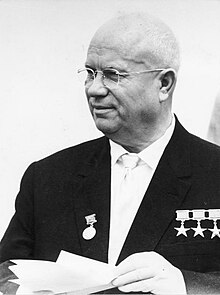Nikita Krushchev
| Nikita Khrushchev Никита Хрущёв |
|
|---|---|

|
|
|
First Secretary of the Central Committee of the Communist Party of the Soviet Union |
|
|
In office 14 September 1953 – 14 October 1964 |
|
| Preceded by | Georgy Malenkov (de facto) |
| Succeeded by | Leonid Brezhnev |
| Chairman of the Council of Ministers | |
|
In office 27 March 1958 – 14 October 1964 |
|
| First Deputies | |
| Preceded by | Nikolai Bulganin |
| Succeeded by | Alexei Kosygin |
| Personal details | |
| Born |
Nikita Sergeyevich Khrushchev 15 April 1894 Kalinovka, Kursk Governorate, Russian Empire |
| Died |
11 September 1971 (aged 77) Moscow, Russian SFSR, Soviet Union |
| Nationality | Soviet |
| Political party | Communist Party of the Soviet Union |
| Spouse(s) |
|
| Children | |
| Alma mater | Industrial Academy |
| Awards |
|
| Signature |  |
| Military service | |
| Allegiance | Soviet Union |
| Service/branch | Red Army |
| Years of service | 1941–45 |
| Rank | Lieutenant General |
| Commands | Soviet Armed Forces |
| Battles/wars | World War II |
|
Central institution membership
Other offices held
|
|
Nikita Sergeyevich Khrushchev (15 April [O.S. 3 April] 1894 – 11 September 1971) was a politician who led the Soviet Union during part of the Cold War. He served as First Secretary of the Communist Party of the Soviet Union from 1953 to 1964, and as Chairman of the Council of Ministers, or Premier, from 1958 to 1964. Khrushchev was responsible for the de-Stalinization of the Soviet Union, for backing the progress of the early Soviet space program, and for several relatively liberal reforms in areas of domestic policy. Khrushchev's party colleagues removed him from power in 1964, replacing him with Leonid Brezhnev as First Secretary and Alexei Kosygin as Premier.
Khrushchev was born in the village of Kalinovka in 1894, close to the present-day border between Russia and Ukraine. He was employed as a metalworker in his youth, and during the Russian Civil War was a political commissar. With the help of Lazar Kaganovich, he worked his way up the Soviet hierarchy. He supported Joseph Stalin's purges, and approved thousands of arrests. In 1938, Stalin sent him to govern Ukraine, and he continued the purges there. During what was known in the Soviet Union as the Great Patriotic War (Eastern Front of World War II), Khrushchev was again a commissar, serving as an intermediary between Stalin and his generals. Khrushchev was present at the bloody defense of Stalingrad, a fact he took great pride in throughout his life. After the war, he returned to Ukraine before being recalled to Moscow as one of Stalin's close advisers.
...
Wikipedia
